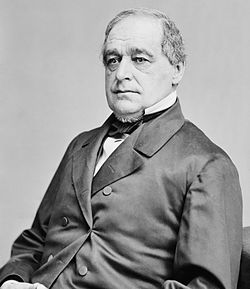| |||||||||||||||||||||
| |||||||||||||||||||||
 County results Hamlin: 50–60% 60–70% Wells: 50–60% | |||||||||||||||||||||
| |||||||||||||||||||||
| Elections in Maine |
|---|
 |
The 1856 Maine gubernatorial election was held on September 8, 1856, in order to elect the governor of Maine. Incumbent Democratic governor Samuel Wells lost re-election against Republican nominee and incumbent United States senator from Maine Hannibal Hamlin. [1] Whig candidate George F. Patten received just over 5% of the vote amidst Hamlin's landslide.


